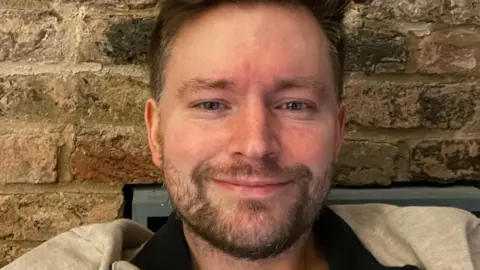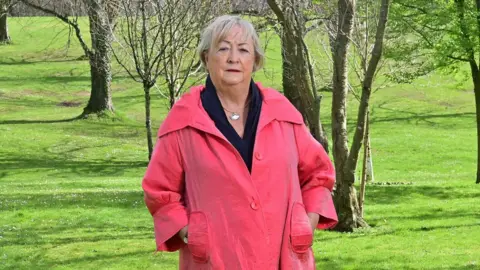Meta may have used books by Gerry Adams to train AI
 PA Media
PA MediaFormer Sinn Féin president Gerry Adams is among a number of authors whose books may have been accessed by technology company Meta to train their latest AI (artificial intelligence) model.
Mr Adams said the books had "been used without his permission", and the matter is now with his solicitor.
An investigation by The Atlantic magazine revealed Meta may have accessed millions of pirated books and research papers through LibGen - Library Genesis - to train its generative AI (Gen-AI) system, Llama.
A spokesperson for Meta said: "We respect third-party intellectual property rights and believe our use of information to train AI models is consistent with existing law."
The Atlantic magazine also published a database of books that had been pirated by LibGen, so many authors have been able to find out if their work appears on the site.
When BBC News NI searched the database a number of authors from Northern Ireland appeared on the list, including Jan Carson, Lynne Graham, Deric Henderson, and Booker prize winner Anna Burns.
Authors from around the world have been organising campaigns to encourage governments to intervene.
Meta, which owns Facebook, Instagram and WhatsApp, is currently defending a court case brought by multiple authors over the use of their work.
 Michael Taylor
Michael TaylorAcademic papers on LibGen database
Michael Taylor, a historian from Ballymena, said it is "infuriating" that Meta may have used his work.
Two of his books, The Interest and Impossible Monsters, both appear on the LibGen database.
"Writers spend years on their books, and contrary to what anybody thinks, very few people make enough money out of writing to live by their pen," he said.
"Meta might be worth more than a trillion dollars, and it might be politically untouchable, but by violating the copyright of so many thousands of books, its actions amount to the single greatest and the most lucrative act of theft in history."
 Pacemaker
PacemakerProf Monica McWilliams is an academic and former politician who has written extensively about the Northern Ireland peace process and domestic violence.
More than 20 of her academic papers and books appear on the database, including those on intimate partner violence and domestic violence against women during conflict.
She said when it came to her attention, she found it "quite shocking".
"The first principle in the academic world is that you direct your reader to your source material, and that isn't happening here," she said.
"It begs the question of what does copyright even mean anymore.
Prof McWilliams donates the royalties from sales of her writing to domestic violence charities like Women's Aid.
"If royalties are not being paid for the work to be used, then ultimately it is the charities that will lose out."
Allow Twitter content?
Writer Glenn Patterson from Belfast has also been affected.
He told BBC Radio Ulster's Good Morning Ulster that it came as an "enormous shock" to him.
It is a "clear infringement", he said, adding that "we should all be bringing it to the attention of our MPs".
Mr Patterson, who is a member of the Society of Authors trade union, said: "We are, of course, all conscious of the supposed benefits of, and there may be many ... of AI.
"But you cannot, in achieving those benefits... act as Meta has done in this instance. We must proceed making sure that for the better of all we're not trampling over a good many to get there."
Londonderry author Claire Allan has published 21 psychological thrillers and romantic comedies. She has also worked as a series consultant on the BBC Northern Ireland series Blue Lights.
Speaking to BBC Radio Foyle's North West Today programme on Wednesday, Ms Allan said she was shocked after reading about the investigation to find her entire body of written work when she searched Library Genesis.
"The sum of 20 years work being used to train AI. It's just really disheartening to see," Ms Allan said.
"It takes so much to create a book, and you put your heart and soul into it.
"For somebody to come along and just scrape what they want from it is frustrating and demoralising."
 Getty Images
Getty ImagesProtest against Meta
Last week, authors gathered in London to protest against Meta's actions and high profile authors including Kate Mosse, Richard Osman, and Val McDermid signed an open letter calling on the Culture Secretary Lisa Nandy to bring Meta management to parliament.
Posting on X, Richard Osman, who wrote the popular Thursday Murder Club series, said: "Copyright law is not complicated at all. If you want to use an author's work you need to ask for permission.
"If you use it without permission you're breaking the law. It's so simple.
"It'll be incredibly difficult for us, and for other affected industries, to take on Meta, but we'll have a good go!"
What is Llama?
Llama is a large language model, or LLM, similar to Open AI's ChatGPT and Google's Gemini.
The systems are fed huge amounts of data and trained to spot patterns within it. They use this data to create passages of text by predicting the next word in a sequence.
Despite the systems being labelled intelligent, critics argue LLMs do not "think", have no understanding of what they produce and can confidently present errors as fact.
Tech companies argue that they need more data to make the systems more reliable, but authors, artists, and other creatives say they should pay for the privilege.
